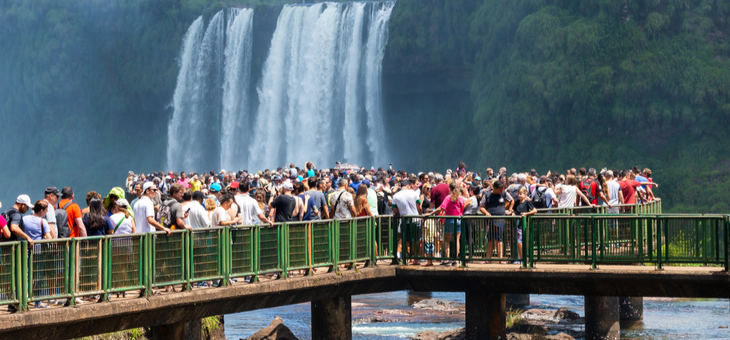The travel industry is one of those hit hardest by the coronavirus pandemic. With many countries still in lockdown, both domestic and international travel are off the table for the time being. But with the industry on pause, it may be the perfect time to address some of the underlying social, economic and environmental damage it causes, allowing it to move sustainably into a post-COVID world.
“For a lot of places, this is the chance for them to reset,” director of Sustaining Tourism Dr Rachel Dodds, who is also a professor of hospitality and tourism management at Ryerson University in Toronto, told Fodors. “The tourism industry has mirrored capitalism, [the idea] that more is always better. More is not always better. We don’t want to go back to what we had two months ago.”
These are two of the key areas we can hope to see change in the travel industry.
Overtourism
Many travellers and industries alike are aware of the devastating effects that overtourism can have on local communities. It leads to excessive pollution, increases rates of sex trafficking and raises rent prices, displacing locals. In 2018, when one-third of all tourists were concentrated in just 300 cities, the Oxford English Dictionary made ‘overtourism’ one of its words of the year.
Yet as tourist destinations became financially dependent on the tourism industry, and travel became affordable to more people, the industry seemed to be trapped in the ever-growing cycle of overtourism. That has all changed since the pandemic hit.
COVID-19 has devastated the $4.22 trillion travel industry, leading to countless redundancies globally and leaving tourist dependent hotspots jobless. The pandemic has ‘stopped the wheel’ of the industry in a way that would have been unimaginable late last year. As devastating as this has been, it gives us an unprecedented opportunity to tackle the worst and most dangerous elements of the industry, while encouraging the growth of more socially, economically and environmentally sustainable alternatives.
In order to make these changes possible, we must tackle overtourism by dispersing travellers away from hotspots and towards less crowded remote areas that would both benefit from their presence and can afford to accommodate them.
Some steps are already being taken. Tourist attractions are increasingly offering tickets for specific time slots in order to stagger crowds. Cities are monitoring and regulating Airbnb rentals. Some countries are advertising lesser-known destinations and attractions off the beaten path, while some have stopped advertising World Heritage sites and major attractions altogether.
Cruises
After repeatedly being called out for high carbon emissions, disrupting marine life and improper waste disposal, it’s no surprise that cruises are one of the least sustainable parts of the travel industry.
While it may make environmental sense to scrap the cruise industry altogether, things are far too economically complicated. Prior to the pandemic, the cruise industry employed a million people worldwide, paid nearly $60 billion in wages and was worth a whopping $183 billion.
In 2018, more than 27 million people holidayed on cruise ships, although one study found that on average passengers spent only $90 a day. In most parts of the world, the cruise industry has no economic impact at all, at least for the majority of the population. This means that while local communities bear the burden of the pollution and overcrowding brought by cruise ship passengers, very little of the money spent by these passengers reaches or benefits locals.
Redistributing the profits of the cruising industry to the local population may be as simple as expanding cruise ship itineraries to incorporate less visited destinations, employ local tour guides and direct tourists towards local restaurants and shops.
The UN World Tourism Organisation has also noted several other factors that the industry needs to tackle in order to become more environmentally sustainable. A reduction in air and noise pollution, protection of coral reefs and the proper treatment and disposal of waste will need to be looked at if the cruise industry is to survive sustainably post-COVID.
Fodors also notes that there are currently no viable solutions to the COVID-related risks that cruise lines pose to passengers, port communities and of potentially spreading the virus. After the role they played in the spread of COVID early on in the pandemic, some travellers may see cruises as floating petri dishes for some time yet. However, this may give the cruising industry the time it needs to make positive economic, social and environmental changes, so that in future travellers can embark on this type of travel with a clear conscience.
Have you witnessed an increase in tourists over the years? Would you pay more to travel with an ethical cruise line?
If you enjoy our content, don’t keep it to yourself. Share our free eNews with your friends and encourage them to sign up.
Related articles:
https://www.yourlifechoices.com.au/travel/destinations/spare-a-thought-for-the-locals
https://www.yourlifechoices.com.au/travel/news/aussies-tackling-overtourism
https://www.yourlifechoices.com.au/travel/cruising/cruise-line-cancellation-policies

